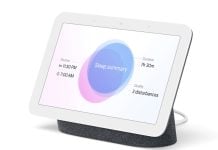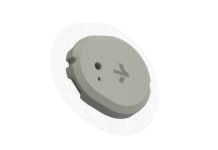Medical and healthcare apps have become increasingly popular in recent years to help individuals manage and be best informed about various conditions. For example, there are specific apps for asthma and other respiratory issues that are pretty common among the general population.
According to the Asthma and Allergy Foundation of America (AAFA), “Asthma is one of the most common and costly diseases in the United States.”
Other chronic respiratory conditions, such as COPD (Chronic Obstructive Pulmonary Disease), are also quite common.
It makes sense that if you are trying to manage or learn more about a condition that you have, using an app (or multiple apps) for asthma or other respiratory issues could be a helpful tool.
Of course, no app should take the place of the guidance of a medical professional. It’s best practice to talk to your physician before using a new app, especially if it will influence how you manage your condition.
In this article, we explore some of the best apps for asthma and other respiratory issues that are available today.
Contents
Suggested readings
- Google’s new study validates smartphone-based heart rate and respiratory rate measurements
- How to setup and check respiratory rate monitoring on Apple Watch and iPhone
- 5 Best air purifiers for your home that help keep your air clean
- Lower your Blood Pressure using these Inspiratory Breath Training devices (IMST)
- Change Breathe app session time on your Apple Watch and improve your mindfulness

Quick list:5 best apps for asthma and other respiratory issues
Don’t have time to read the entire article right now? Take a look at our quick list to get a brief introduction to each app.
- Propeller Health: Best overall option.
- COPD Pocket Consultant Guide: The leading option for healthcare provider/patient coordination.
- DailyBreath – Asthma & Allergies: Outstanding option focuses on environmental triggers.
- My Asthma: Best option to create a customized action plan for an asthma attack.
- myCOPD by myMHealth: Most comprehensive, research-backed option.
5 best apps for asthma and other respiratory issues
Below you’ll find an overview of each app with information to help you decide which one could be best the best fit for your needs.
Propeller Health
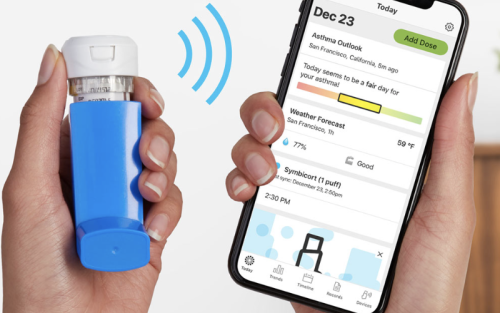
The Propeller app is an FDA-approved app and sensor that helps its users better manage and control their asthma or COPD. And it syncs your inhaler usage data with Apple’s Health app!
How it works is that users attach a Propeller sensor directly to their inhaler. The sensor tracks where, when, and how often you use the medication. That information then gets sent directly to the companion app.
Over time, the app learns these patterns and can alert you to the causes of potential flare-ups and identify your triggers.
These patterns and reports can then be sent to your managing physician to help them adjust your treatment plan as needed.
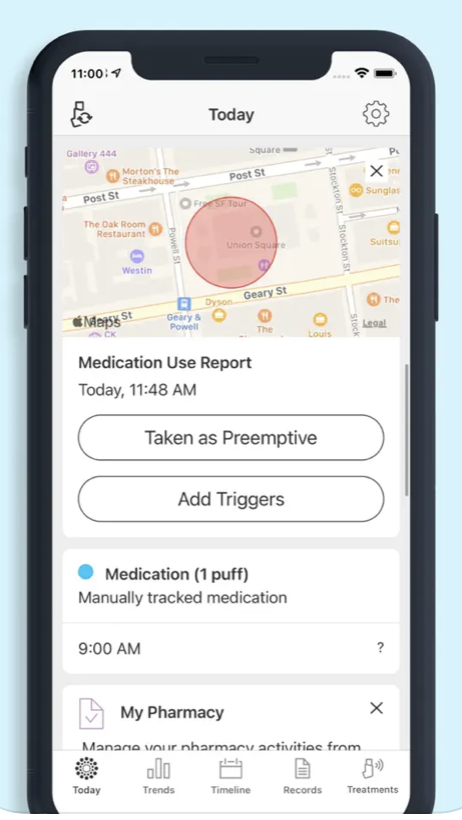
The app can also send reminders to take your medication to avoid flare-ups before they even begin.
You’ll also get a daily weather forecast that assesses the air quality. This is especially helpful if environmental pollutants are what causes asthma or COPD exacerbation.
The app has gotten great reviews online and has helped more than 140,000 users have fewer days without symptoms and fewer trips to the hospital or emergency room.
I’ve seen the Propeller sensor online, sometimes listed for $80, and in other places for $300.
In some cases, plans to get this discounted or entirely covered by insurance may be available. You’ll need to check with your provider.
However, the app is FREE and available for iOS and Android users.
Due to its researched-backed, FDA-approved status, we think this is one of the best apps for asthma and other respiratory issues out on the market right now.
COPD Pocket Consultant Guide
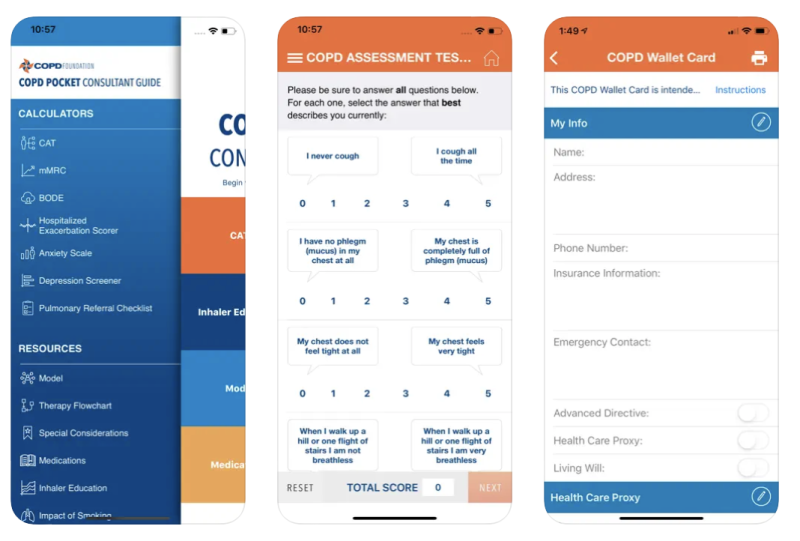
This is the COPD Foundation’s very own app and guide for both healthcare providers and their patients.
The app’s purpose is to act as a guide to support the treatment and management of COPD.
What’s most interesting is that there is a specific view within the app designed for the healthcare provider, but this view can then be switched if used by the actual patient.
The healthcare provider’s view gives access to several assessment tools, including an exacerbation screen, a spirometry screen, interactive charts for medications and other therapies, and a symptom score.
There is also an assessment that looks at anxiety and depression, which is so valuable.
All of these different scores and assessments ultimately help the provider determine the best, most individualized plan of care for that particular person.
If you are a patient or caregiver, you’ll use the patient view to provide you with different features.
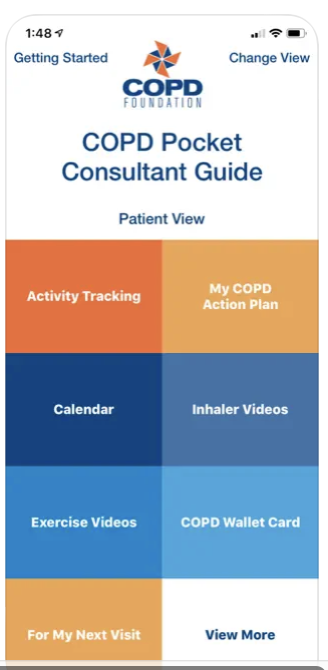
You’ll have access to all your assessment results and different tracking features where you can log symptoms or situations of exacerbation. You’ll also have a whole library of inhaler and exercise videos, appointment reminders, and tons of additional resources.
It’s a great interactive tool that keeps you and your healthcare provider connected and on the same page throughout your treatment.
And because the COPD Foundation backs it, you can trust the resources and therapy plans within the app.
The app is initially free to download but offers in-app purchases (users have reported around $5.99) to access all of its full features.
It is available for both iOS and Android devices.
DailyBreath – Asthma & Allergies

This app is focused on environmental triggers that may cause an asthma flare-up.
It’s common for most people to get a headache, a runny nose, or a scratchy throat if the air quality is poor (e.g., during forest fire season). However, asthma patients may have a much greater worsening of their symptoms based on these environmental factors.
The DailyBreath app gives you a space to record all of your symptoms for tracking, provides a self-care section for simple things to try at home, and displays a discussion board where you can talk with other people living with asthma.
The app should not replace professional medical supervision, but it’s a nice tool to have in your pocket to document additional information to share with your physician.
The app also offers an extensive DailyBreath Forecast page that provides a Risk Index score based on pollen count, ozone quality, humidity, and an overall air quality index (AQI), among many other factors.
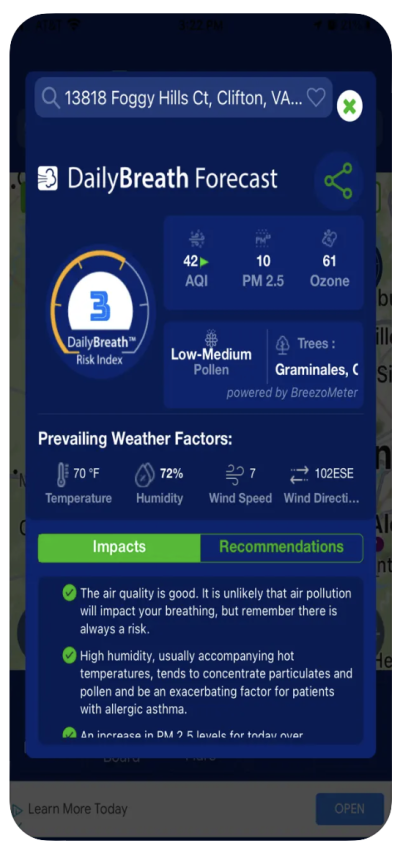
You’ll find a list of information about how these factors may impact your health, and then it also provides some recommendations on what to do if you’re having a flare-up based on the air quality that day.
I also like the fact that they have a Community Flare-Up Map to show if others are also reporting similar flare-ups or symptoms in your area.
The app is free to use, but if you want an ad-free version with a few other features (like medication reminders, a last five flare-up table, etc.), then you can pay $.99/annually, which is basically nothing.
DailyBreath is available for both iOS and Android users.
MyAsthma

The MyAsthma app is a user-friendly platform that helps you and your healthcare provider create a custom plan of action in case of an urgent situation or an actual emergency.
The app is also a great educational tool with resources about what asthma is, common triggers, and how it is treated.
The plans on the app are highly customizable. They offer everything from a child-specific plan, a 3-stage plan, a 4-stage plan, and others.
For example, the 4 stage plan includes recommendations on what to do when you’re feeling good when your symptoms are getting worse, when they’re severe, and when you think you’re in a state of emergency.
Each action plan is essentially a set of steps to take in every asthma scenario. All plans are created with your healthcare provider so that you know you are taking the correct steps for your unique situation.
MyAsthma also provides a first aid section to implement for yourself or another person. This is based on the stage of asthma attack they are in.
For example, if the person has mild symptoms, the app recommends sitting down and treating with two doses of a reliever inhaler.
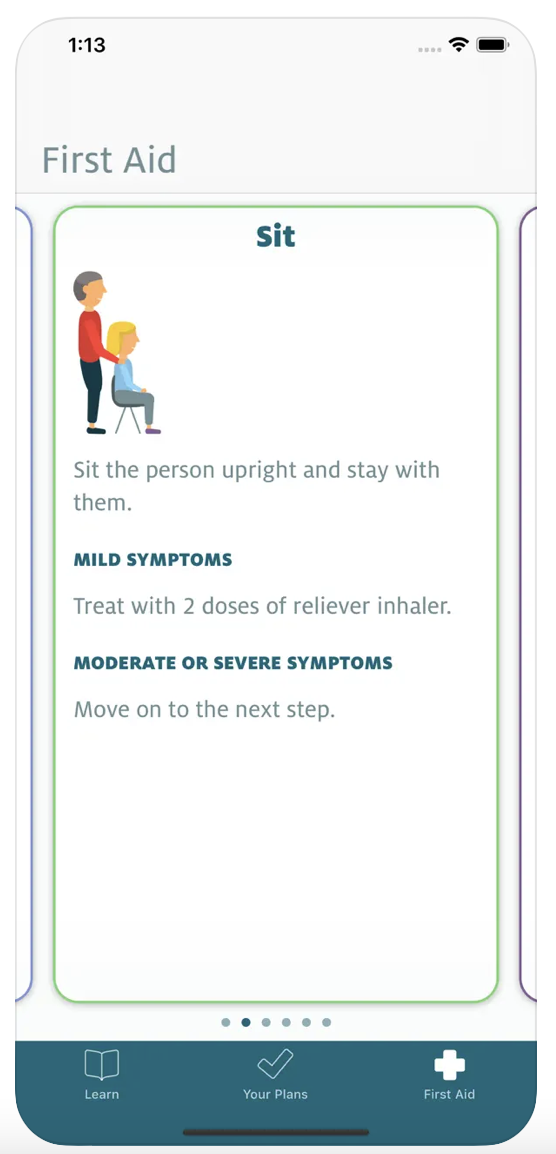
Different steps and recommendations will be provided if symptoms move to a moderate level.
MyAsthma is less of a tracking app and more of a response to what to do when you feel symptomatic. Whether they are mild symptoms or not, the app can help guide you to a certain point.
Remember that if you genuinely need medical care, seek out the right resources (an urgent care clinic, the ER, etc.) to get the treatment you need.
The app is free to use and is available for both iOS and Android devices.
myCOPD by myMHealth
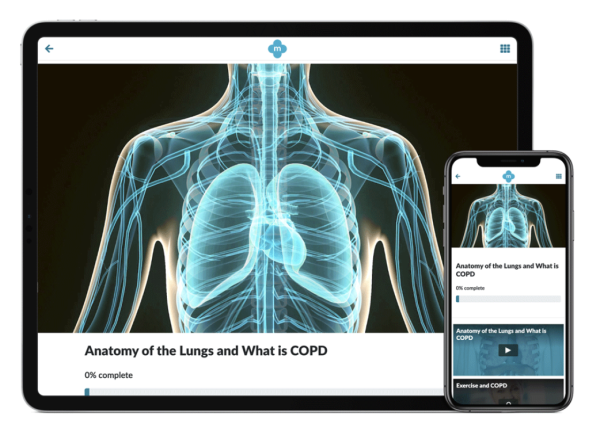
The myCOPD app is perhaps the most comprehensive and feature-rich option out there. Some may view this as a win, while others may view it as overwhelming. So keep that in mind.
It is also externally peer-reviewed and NHS-approved, so you’ve got some good research and approval behind the information in this app.
Some of the features of myCOPD include the following:
- Inhaler technique videos.
- Online pulmonary rehab classes.
- Activity diary (activity, class, etc. tracking.)
- Educational courses (anatomy classes, exercises classes.)
- COPD checklists for best control and management of the condition (checking inhaler, smoking cessation, oxygen saturation, etc.)
- Symptom reports over time (e.g., monitor how medications are working.)
- Weather and pollution forecasts.
- Secure messages to your healthcare provider (if they sign up to use the same platform.)
There are other features, but this gives you a pretty extensive list to get an idea.
The graphics are great within the app, and navigation around the platform is very user-friendly.
If you want something as extensive as this, where you can do everything from tracking all aspects of your COPD, attending online classes, and monitoring the weather and air pollutants, this may be the best match for you.
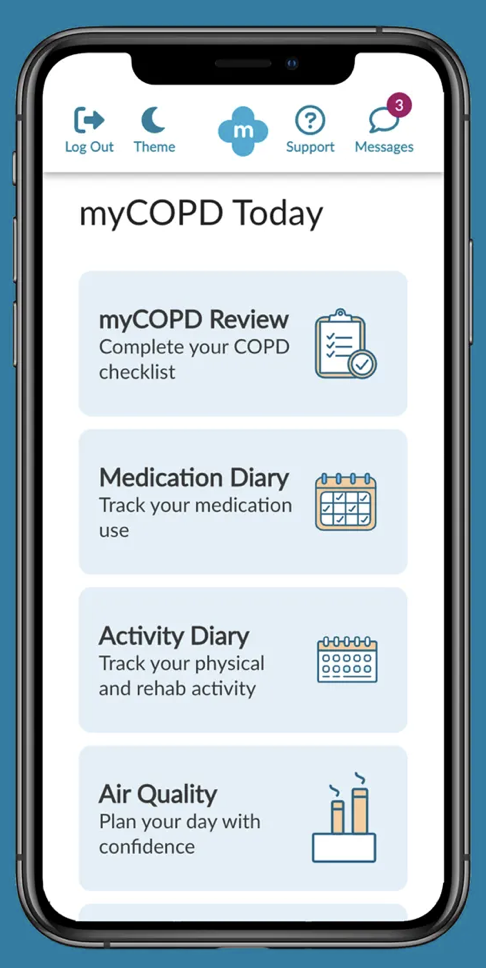
Like I said earlier, though, this is a very hefty app. Some individuals may find that there is too much information, and it is just too overwhelming to manage and navigate.
If it does sound like the perfect match for you, the app is free but will prompt in-app purchases to unlock all the features. It is available for both iOS and Android.
As a quick side note, the myMHealth platform also offers asthma, diabetes, and heart health versions of this app as well. Check them out here.
Final thoughts
Respiratory conditions like asthma and COPD are pretty common. It makes sense to incorporate an app into your healthcare plan to help you best manage it.
We’ve provided what we think are five of the best apps for asthma and other respiratory issues that you can begin using today.
Whether you want an app that is extremely simplistic or an incredibly feature-rich option, there is usually something for everyone.
If you are someone who has asthma or COPD (or another respiratory condition), which app would you pick?


